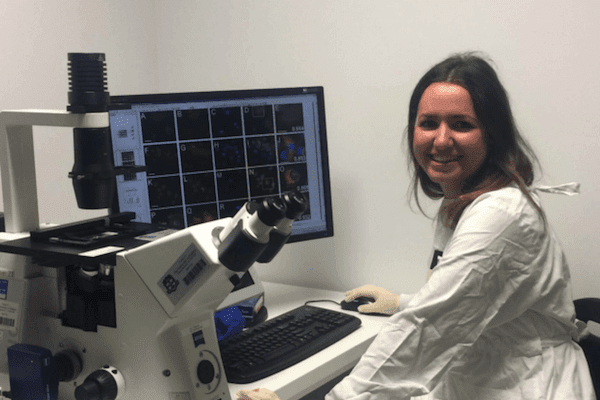Having completed her Phd in medicine at the age of just 24, and in 2018 being named Australia’s youngest ever National health and Medical Research Council Grant recipient, she’s now up for the 2019 NSW Young Woman of the Year award.
She says that at her current level, she sees an equal number of women and men but is concerned that as she scans up the professorial levels, a notable gender imbalance emerges.
The pancreatic and brain cancer researcher and UNSW Scientia Fellow, based at the Children’s Cancer Institute, has been fascinated by how the human body works in both normal and diseased states, and how medicine can help, since she was an school.
But it was seeing close family members go through a cancer diagnoses that really spurred her on.
Now she’s working to develop new anti-cancer drugs that target drug resistance and suppress cancer spread, including for pancreatic cancer — which has some of the lowest survival rates and is often diagnosed late at advanced stage, with 92% of patients dying within the first five years after diagnosis.
He biology project aim to better understand how cancer cells grow and adapt to their environment, why drugs become less effective and the development of nanoparticles to improve drug delivery. “We are understanding more about the genetics of the disease and, with personalised medicine, we are hopeful that we can improve survival rates,” she says.
“It is wonderful to be acknowledged for work in this field and I am so grateful to be nominated as a finalist. It is vital to encourage more women to study medicine and stay working in the field.
Below, Dr Merlot answers some questions from Women’s Agenda.
Can you tell us a little about how you got involved in researching pancreatic and brain cancer?
Like many Australians, my family has been impacted by cancer. It’s their stories and struggles that encouraged me to become a cancer researcher to make a difference to improve patient outcomes. Specifically, I am focusing my research on some of the deadliest cancers, such as pancreatic and brain cancer, which, unlike other cancers, have seen very limited progress over decades. We really need to urgently improve these survival rates.
And at one point did you realise you wanted to pursue research?
Since school, I’ve always had a strong interest in the human body and how it functions in disease states and how medicine can alter these states. My first-hand experiences and the many inspirational women and men in the field pushed me to enter this career.
In the medical research field, do you notice many discrepancies between the opportunities given to men and women and/or any particular hurdles that might be preventing women getting ahead?
There are roughly an even number of women in medicine and science at a junior level. However only about 30% of women hold senior and professorial positions. I think this comes down to women having greater career disruptions due to maternity leave and carer responsibilities. We need these responsibilities to be equally shared and to empower women, provide greater support and flexibility in the workplace to help this imbalance.
How have others supported you in your career? Have you had a mentor that has helped shape your career as a researcher?
I have been very fortunate to have the support of fantastic and passionate mentors both men and women. They have been role models that have on a technically level provided feedback, trained me to problem solve and to think critically, greatly improving my research skills. Importantly, they have always believed in me, provided support and always encouraged my curiosity.
You completed your PhD in medicine at 24 years old, how did you stay motivated to study and achieve this at such a young age?
That’s a great question. No one finds a PhD easy, no matter how old you are, but having the support of mentors, colleagues, family and friends really helped me to stay motivated to work hard and to achieve my goals. Moreover, knowing that my research could one day help make a difference, really pushed me to keep going, particularly through obstacles.
Any tips or advice regarding how to pack so much into just a few short years, as you did with your degrees?
Nothing worthwhile is ever easy. It’s going to require lots of hard work and determination. Don’t forget your bigger or end goal and what motivated you to enter the field. Also, don’t forget to pause and breathe from time to time.
What does an average day look like for you?
An average day varies. Sometimes we will be performing experiments in the lab. We perform studies using a variety of models, including human cells, animals, such as mice, or patient samples. Other days, we will be working on writing publications or grants, supervising students, or presenting at various conferences or events.


